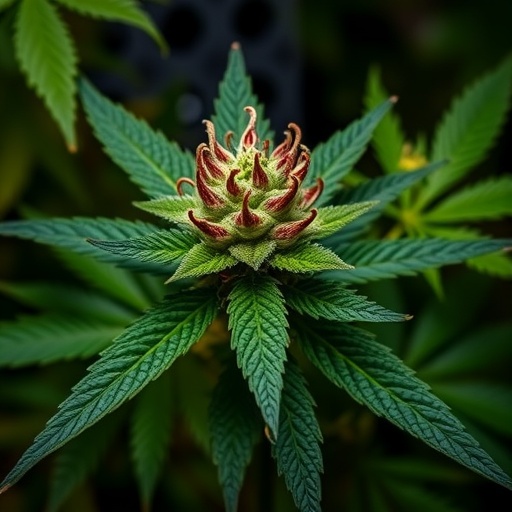In a groundbreaking development that could redefine the landscape of antiparasitic treatments, researchers have unveiled the first evidence suggesting that a full-spectrum extract from Cannabis sativa exhibits significant efficacy against the parasitic tapeworm Echinococcus granulosus sensu stricto. This particular species is responsible for cystic echinococcosis, commonly known as hydatid disease, a serious zoonotic condition that poses grave public health challenges worldwide. The study, recently published in the reputable journal Acta Parasitologica, presents a promising new avenue for therapeutic intervention that leverages the complex phytochemical profile of cannabis rather than isolated cannabinoids alone.
The research team—led by Federico Gatti, Carmela M. Albani, and Claudia L. Ramírez—undertook a meticulous investigation into the antiparasitic potential of a full-spectrum extract derived from Cannabis sativa. Unlike previous studies that mostly focus on singular bioactive cannabinoids such as THC or CBD, this study embraces the synergistic effect—the so-called “entourage effect”—of the entire phytochemical milieu, which includes cannabinoids, terpenes, flavonoids, and other secondary metabolites. Such an approach arguably reflects a more holistic and potentially more effective treatment modality against complex parasites like Echinococcus granulosus.
Cystic echinococcosis results when Echinococcus granulosus sensu stricto larvae form cystic structures in intermediate hosts, including humans. This parasitic infection can lead to severe complications due to the growth and rupture of hydatid cysts in vital organs, primarily the liver and lungs. Conventional treatment primarily involves invasive surgery and antihelminthic drugs such as albendazole and mebendazole, which, despite their utility, come with variable efficacy and notable side effects. Hence, the emergence of novel treatments based on natural products is highly desirable to complement or substitute existing therapeutic protocols.
.adsslot_XO9GTVoBWz{ width:728px !important; height:90px !important; }
@media (max-width:1199px) { .adsslot_XO9GTVoBWz{ width:468px !important; height:60px !important; } }
@media (max-width:767px) { .adsslot_XO9GTVoBWz{ width:320px !important; height:50px !important; } }
ADVERTISEMENT
One of the key findings was the profound parasitic degeneration observed under microscope examination after treatment. The extract promoted disruption of the tegument—an outer layer critical to parasite survival—resulting in increased permeability and susceptibility to damage. Additionally, the researchers noted apoptotic-like features within the parasite cells, suggesting that the extract might induce programmed cell death pathways. These observations open up intriguing mechanistic questions about how the active phytochemicals modulate parasite physiology at the molecular level.
The implications of these findings extend beyond just the treatment of echinococcosis. Parasitic diseases remain a significant burden globally, and the rise of drug-resistant parasitic strains necessitates alternative approaches. Natural plant-based therapies, especially those exploiting complex mixtures rather than single molecules, could represent a new frontier in anti-parasitic drug discovery. Moreover, cannabis, being a widely studied and increasingly legalized plant, offers accessibility and a relatively well-characterized safety profile for human use, although rigorous clinical testing remains essential.
Furthermore, the study’s findings contribute to the broader understanding of the “entourage effect” in therapeutic applications, a concept much discussed in medicinal cannabis literature but rarely explored in antiparasitic contexts. By validating that the entire phytochemical spectrum can be harnessed to achieve biological efficacy against parasites, this research may stimulate a re-evaluation of how medicinal plant extracts are studied and applied in parasitology and infectious disease medicine.
Considering the global distribution and public health impact of cystic echinococcosis, especially in endemic regions with limited healthcare resources, plant-based antiparasitic agents could provide a cost-effective and accessible alternative or adjunctive treatment. This approach aligns well with integrated parasitic disease management strategies where sustainable and affordable solutions are critical.
In addition to therapeutic potential, this study invites further biochemical analyses to elucidate the exact molecular targets of the cannabis extract constituents within Echinococcus granulosus larvae. Such mechanistic insights would enable rational drug design and optimization of extract formulations to maximize efficacy while minimizing adverse effects. Advanced techniques such as transcriptomic, proteomic, and metabolomic profiling of treated parasites would be invaluable in this regard.
This pioneering research marks a significant milestone in parasitology by bridging traditional botanical medicine with modern pharmacology to address a lethal parasitic disease. As the world continues to grapple with emerging and re-emerging infectious agents, interdisciplinary approaches combining natural product chemistry, parasitology, and clinical pharmacology will be pivotal to discovering novel therapeutics.
The study’s publication is timely, as cannabis-derived compounds are increasingly gaining legitimacy and scientific interest not just in neuropharmacology but in the treatment of diverse infectious and inflammatory diseases. The extension of this interest into parasitology broadens the scope of cannabis research and underscores the therapeutic versatility of this ancient plant.
Moving forward, the challenge lies in establishing regulatory frameworks and clinical guidelines to safely incorporate full-spectrum cannabis extracts into antiparasitic treatment regimens. Stakeholders from the scientific community, public health, and regulatory bodies will need to collaborate closely to navigate the complexities of standardization, clinical trials, and approval processes.
In summary, the report by Gatti, Albani, Ramírez, and colleagues introduces a paradigm-shifting perspective on the fight against Echinococcus granulosus sensu stricto. It powerfully illustrates the untapped potential of complex botanical extracts in combating parasitic diseases, an area historically reliant on synthetic drugs with significant limitations. Through rigorous scientific validation, the humble cannabis plant may emerge as a powerful ally in parasitology, offering hope for safer, more effective, and more accessible antiparasitic therapies in the near future.
Subject of Research: Antiparasitic effects of Cannabis sativa full-spectrum extract on Echinococcus granulosus sensu stricto
Article Title: First Report of the Anti-Parasitic Effect of a Cannabis sativa full-spectrum Extract on Echinococcus granulosus sensu stricto
Article References:
Gatti, F., Albani, C.M., Ramírez, C.L. et al. First Report of the Anti-Parasitic Effect of a Cannabis sativa full-spectrum Extract on Echinococcus granulosus sensu stricto. Acta Parasit. 70, 157 (2025). https://doi.org/10.1007/s11686-025-01090-3
Image Credits: AI Generated
Tags: Acta Parasitologica study findingscannabinoids and terpenes synergycannabis extract anti-parasitic effectscystic echinococcosis researchEchinococcus granulosus treatmententourage effect in cannabisfull-spectrum cannabis efficacyholistic antiparasitic approachesphytochemical profile of cannabispublic health challenges with parasitestapeworm infection treatmentszoonotic disease therapies





